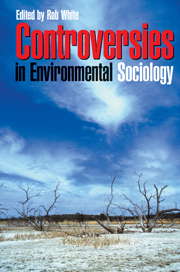Book contents
- Frontmatter
- Contents
- Tables and Figures
- Author Notes
- Abbreviations
- Introduction: Sociology, Society and the Environment
- PART I SOCIAL PERSPECTIVES
- PART II SOCIAL TRENDS
- PART III SOCIAL ISSUES
- 12 Moulding and Manipulating the News
- 13 Agricultural Production and the Ecological Question
- 14 Pathological Environments
- 15 Assessing the Social Consequences of Planned Interventions
- 16 Criminology, Social Regulation and Environmental Harm
- Index
- References
16 - Criminology, Social Regulation and Environmental Harm
Published online by Cambridge University Press: 05 June 2012
- Frontmatter
- Contents
- Tables and Figures
- Author Notes
- Abbreviations
- Introduction: Sociology, Society and the Environment
- PART I SOCIAL PERSPECTIVES
- PART II SOCIAL TRENDS
- PART III SOCIAL ISSUES
- 12 Moulding and Manipulating the News
- 13 Agricultural Production and the Ecological Question
- 14 Pathological Environments
- 15 Assessing the Social Consequences of Planned Interventions
- 16 Criminology, Social Regulation and Environmental Harm
- Index
- References
Summary
The interface of criminology, as a discrete field of study, with environmental issues in a manner that involves concerted professional attention and hands-on intervention has been forcefully advocated by Lynch & Stretsky in a recent article.
In general, criminologists have often left the study of environmental harm, environmental laws and environmental regulations to researchers in other disciplines. This has allowed little room for critical examination of individuals or entities who/which kills, injures and assaults other life forms (human, animal or plant) by poisoning the earth. In this light, a green criminology is needed to awaken criminologists to the types of major environmental harm and damage that can result from environmental harms; the conflicts that arise from attempts at defining environmental crime and deviance; and the controversies still raging over possible solutions, given extensive environmental regulations already in place
(Lynch & Stretsky 2003: 231).Sociologically speaking, any attempt to take up the challenge offered here will require rigorous and sophisticated analysis of the social dynamics that shape and allow certain types of activities harmful to the environment (and human beings and animals) to take place over time. This sort of analysis, in turn, demands that environmental issues be framed within the context of a sociological, and one might add criminological, imagination (see Wright Mills 1959; White 2003). That is, study must appreciate the importance of situating environmental harm as intrinsically socially and historically located and created.
- Type
- Chapter
- Information
- Controversies in Environmental Sociology , pp. 275 - 292Publisher: Cambridge University PressPrint publication year: 2004
References
- 2
- Cited by



